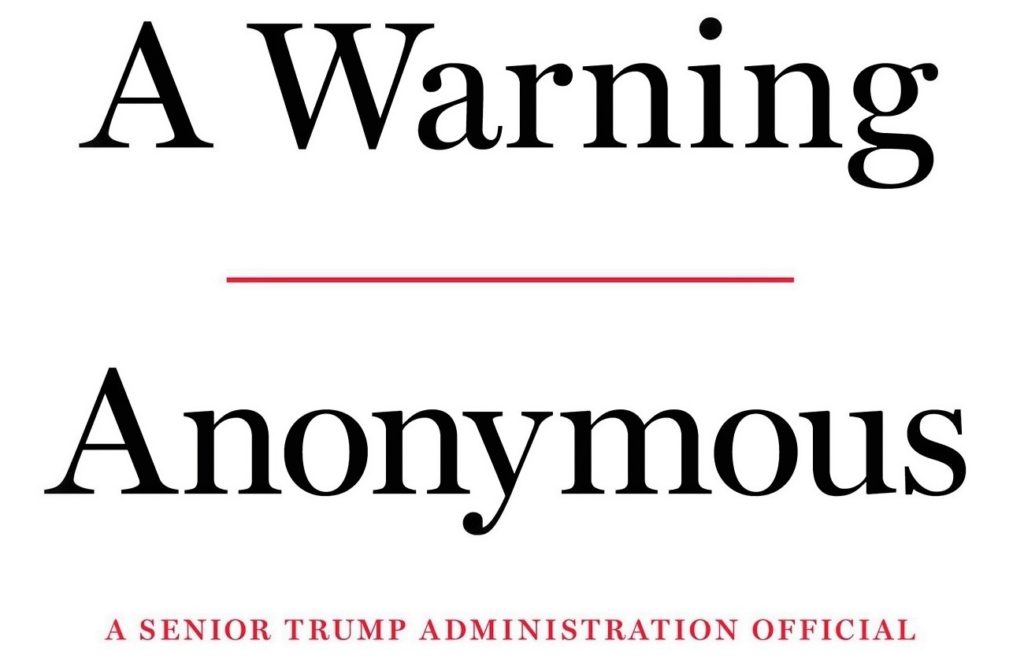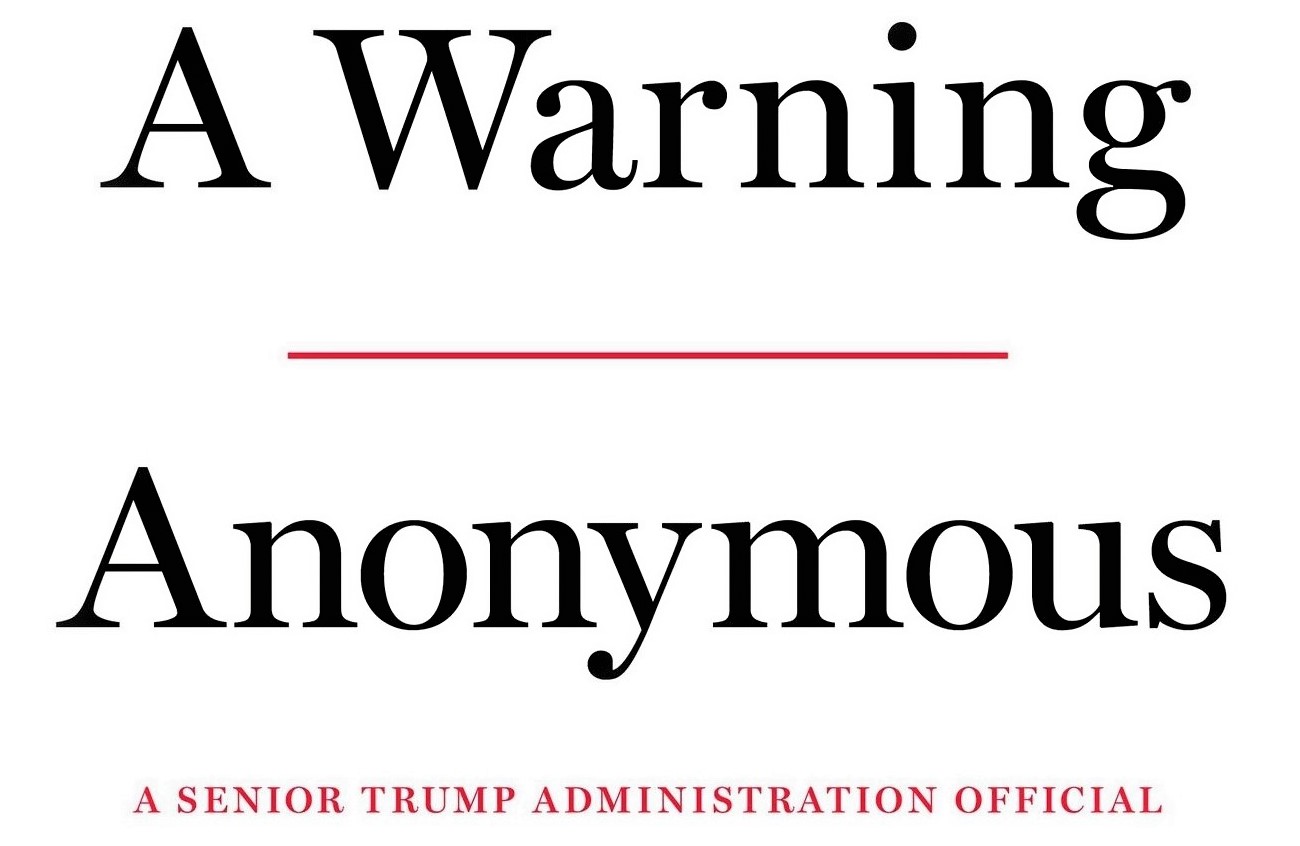
The first warning came on September 5, 2018 when The New York Times published an anonymous Op-Ed from “a senior official in the Trump administration.”
“The dilemma,” anonymous writes, “which [Trump] does not fully grasp, is that many of the senior officials in his own administration are working diligently from within to frustrate parts of his agenda and his worst inclinations.
“I would know. I am one of them.”
Over the last year the laundry list of personal attacks, policy shifts based on his “gut,” lies, obstruction, and now his allegedly asking the leader of a foreign country to investigate a potential political rival has only served to validate what this anonymous source made known a year ago.
“The root of the problem is the president’s amorality. Anyone who works with him knows he is not moored to any discernible first principles that guide his decision making.”
Now, she or he has expanded their concerns into a book, “A Warning,” due for release next week. However, the focus of this commentary is on the author’s wish to remain anonymous.
In a commentary I wrote last year (Who is Deep Throat?), I talked about the importance of such individuals despite their need for anonymity.
“Whistleblowers have a long history of being criticized and slandered,” I wrote, “and only a rare few are ever acknowledged for the moral courage they demonstrate. Brown & Williamson tobacco insider Jeffrey Wigand,” who faced a wall of harsh criticism, had originally supplied information to the FDA anonymously and followed up with an initially anonymous interview on the CBS News program 60 Minutes.
“We need whistleblowers,” I argued, “individuals with the requisite moral courage to act on behalf of the public good in our communities, corporations and government.”
While there are no protections outside the government, the purpose of the federal Whistleblower Protection Act is twofold: to call attention to and objectively examine allegations of wrongdoing; and to ensure that the individual reporting is not subjected to retaliation.
Nonetheless, as we have witnessed, Trump has no sense of civility regarding anyone who criticizes him publicly, and that includes the federal whistleblower who first notified the Intelligence Communities’ Inspector General about what the IG later described as a “credible and urgent” matter regarding the president’s call to Ukrainian President Zelensky.
“Whistleblowers are a check and balance of last resort,” said Sherron Watkins, who blew the whistle on accounting fraud at Enron. “To me, when we seek out the messenger, the whistleblower, we’re doing the wrong thing
“Frank Serpico, [who first reported anonymously and] memorably exposed corruption in the New York police department, offered a bleak view of the situation.
“Whistleblowers will always be treated the way they are,” he continued. “They do this because, as a whole, whatever the organization is, they want to discourage it – because it affects whatever shenanigans they’ve got going on.”
However, one of the best examples of anonymous works comes from our history’s own Federalist Papers.
In a series of 85 essays, “Publius’ ” purpose was to make the case to the public about the importance of ratifying the U.S. Constitution. The authors — later determined to be Alexander Hamilton, John Jay and James Madison — wanted their arguments to be the focus of decision-making, not their personalities.
“I have decided to publish this anonymously,” the author of “A Warning” affirms, “because this debate is not about me. It is about us. It is about how we want the presidency to reflect our country, and that is where the discussion should center. Some will call this ‘cowardice.’ My feelings are not hurt by the accusation. Nor am I unprepared to attach my name to criticism of President Trump. I may do so, in due course.”
Unfortunately, history has also shown where whistleblowers have easily become the target and their concerns are pushed aside.
That’s what happened when Cynthia Cooper first stepped forward regarding the massive fraud at WorldCom. That’s what happened when FBI agent Colleen Rowley who, after the 9/11 attacks, wrote a paper for FBI Director Robert Mueller documenting how Washington headquarters failed to take action on information provided by the Minneapolis field office where Rowley was stationed regarding its investigation of suspected terrorist Zacarias Moussaoui.
After Rowley testified before a Senate subcommittee and the 9/11 Commission about the failures and mishandling of information, Director Mueller reorganized the Bureau creating a new Office of intelligence to deal with counterterrorism.
Remarkably, while Trump and his supporters’ rail against the latest whistleblower as well as the anonymous source inside the administration, they have no trouble rationalizing their belief in QAnon, an anonymous source who claims, despite a lack of evidence, of a “Deep State” working against the Trump administration.
“Removing my identity from the equation,” anonymous writes, “deprives [Trump] of an opportunity to create a distraction. What will he do when there is no person to attack, only an idea?”
Do I wish these individuals would directly report evidence of wrongdoing?
Of course, but the world doesn’t work that way. They would instantly be attacked as Jeff Wigand was, as Colleen Rowley was, as Cynthia Cooper had been.
Without Frank Serpico’s anonymous reporting, how much longer would corruption have continued in the New York Police Department?
Without Woodward’s anonymous “Deep Throat,” how much more damage would Nixon and his co-conspirators have done to the country?”
Without Publius, how long would it have taken to ratify our Constitution?
Ultimately, I’m sure we’ll learn who the source is. In the meantime, my hope is that we focus on the message, not the messenger.
Comments










